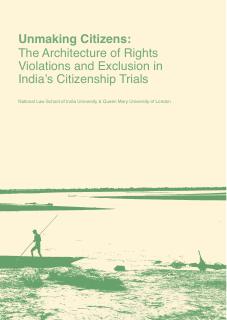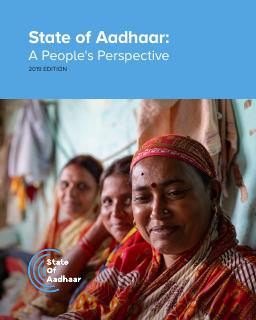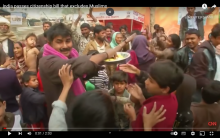“My younger son went to procure rations one day, and was informed by the shopkeeper that he would no longer be able to provide us with ration supplies. This was because I had apparently been declared a foreigner without my knowledge”.
Testimony of one of the 1.9 million people affected by the citizenship crisis in Assam
KEY ISSUES
- In August 2019, the citizenship status of 1.9 million people in Assam was rendered uncertain when they were excluded from the new National Register of Citizens. Tens of thousands of those affected have been declared foreigners in appeal before “Foreigners Tribunals”.
- In late 2019, the passing of the Citizenship Amendment Act (CAA) introduced a preferential pathway to citizenship for Hindus, Christians, Buddhists, Parsis, Jains and Sikhs – discriminating against Muslims and other groups.
- There are no official statistics on statelessness in India and data reported by UNHCR only accounts for Rohingya refugees in the country.
- Since 2017, Rohingya in India have faced a deteriorating protection situation, characterised by an erosion of their legal status and enjoyment of rights, as well as the increased incidence of detention.
- There are no safeguards to protect children born in the country from statelessness, nor any to prevent statelessness for foundlings.
- India is not a signatory to either the 1954 or 1961 statelessness conventions and has no statelessness determination or protection framework in place.
STATELESSNESS IN INDIA
Since the independence and partition of India, the country’s citizenship laws have become progressively more restrictive, with new rules sometimes also being applied retroactively. This has led to exclusion for some people with long-standing ties to the country, while also prolonging statelessness across multiple generations for refugees who do not hold citizenship of their country of origin. Among the communities affected by statelessness or the risk of statelessness in India are Chakmas, Rohingya from Myanmar and refugees from Tibet.
Today, two major issues dominate the picture in terms of nationality and statelessness in India. A massive citizenship ‘verification’ exercise in the state of Assam, which called into question the status of 1.9 million people, when they were excluded from the National Register of Citizens upon its publication in August 2019 and tens of thousands of those affected have subsequently been declared foreigners under the appeals process before the “Foreigners Tribunals” (FTs). Later the same year, the passing of the Citizenship Amendment Act (CAA) introduced a preferential pathway to citizenship for Hindus, Christians, Buddhists, Parsis, Jains and Sikhs – discriminating against Muslims and other groups. The inclusion of religious criteria in the law elicited widespread protest in the country and beyond. Such discrimination is not only contrary to international law, but also prompted concern that this legislation may have much more far-reaching impacts as part of “a systemic plan to revoke citizenship from Muslims and vulnerable populations”.
India is not a signatory to either the 1954 or 1961 statelessness conventions and has no statelessness determination or protection framework in place. There is no comprehensive data on the scale of the problem of statelessness in India. At the end of 2023, UNHCR reported a figure of 22,646 stateless people in India. However, this only accounts for the Rohingya population registered with UNHCR. Other groups, including those left stateless or at risk of statelessness in Assam, are not included in these statistics.
In 2009, India introduced the Aadhaar card: a single identity card linked to various benefits, services and facilities. Enrolment numbers are the higher than any other digital identity card in the world, and, as such, it has become an increasingly critical digital identity tool in India. What rights a person can exercise in India is strongly linked to possession of the Aadhaar card. For stateless people, including stateless refugees, this can pose a problem. Since October 2018, refugee cards are no longer considered a valid documentation to obtain Aadhaar, affecting Rohingya and other refugees whose Long Term Visas are no longer being renewed, or who were only granted UNHCR Refugee Cards. Those excluded from the National Register of Citizens in Assam are also unable to apply for an Aadhar, excluding them from vital rights and services.
RIGHT TO NATIONALITY IN INDIA
Citizenship in India is governed by the 1950 Constitution of India and the 1955 Citizenship Act, which has since undergone a number of substantial amendments. Gender discrimination was removed in the 1992 Citizenship Amendment Act, but other changes have made the rules more restrictive. Successive amendments in 1986 and 2003 made birthright citizenship contingent on parental status, and children born in India only acquire citizenship if one parent is an Indian citizen and the other is not an “illegal migrant”. This transformed the system from a jus soli regime to a largely jus sanguinis regime. There are no safeguards to protect children born in the country from statelessness, nor any to prevent statelessness for foundlings.
There is no facilitated naturalisation for stateless people and there are naturalisation difficulties for both adults and minors due to requirements such as specific documentation, residency requirements, foreign passports, and nationality of the parents. The 2003 Citizenship Amendment Act introduced the term “illegal migrant” into the citizenship rules, denying access to citizenship by naturalisation and registration to people who fall in this category. The 2019 Citizenship Amendment Act explicitly discriminates against Muslims and other groups, by creating a preferential pathway to citizenship for other religions such as Hindus, Christians, Buddhists, Parsis, Jains and Sikhs, with the cut-off date on 31 December 2014. Anyone from these non-Muslim groups who came after that date will not be eligible for CAA benefits. They have been exempted from the definition of the term “illegal migrant” and from prosecution for immigration offences and can apply for expedited naturalisation and registration. This discrimination is carried out under the guise of protecting minority rights of these groups, but there are concerns that the new rules will, in practice, engender greater exclusion of Muslim and other groups.
India’s Citizenship Act provides for the possibility of deprivation of nationality on a number of different grounds, including: fraud, disloyal behaviour, association with an enemy during war, imprisonment in any country within 5 years of registration or naturalisation and residing outside India continuously for 7 years (without registering in the prescribed manner). The law does not provide a safeguard to prevent a citizen from being rendered stateless through deprivation of Indian nationality.
NATIONALITY DEPRIVATION IN ASSAM
Through the 1985 Assam Accord and the 1986 Citizenship Amendment Act, a distinct citizenship system was formed for the Assam state. Despite detailing that those entering Assam prior to 1971 were entitled to naturalisation, interpretation by officials had the effect of retroactively denying citizenship by birth to persons who were born in Assam prior to 1985, as well as citizenship by descent. The separate citizenship standard in Assam also formed the basis for large-scale citizenship identification through three parallel processes: individual citizenship determination proceedings in Foreigners Tribunals that have been underway since 1964, the state-wide updating of the National Register of Citizens (NRC) in Assam which was sanctioned by India’s Supreme Court in 2013 and the “Doubtful Voter” (D-Voter) system by categorising people of being undocumented immigrants from Bangladesh.
In 2019, the final draft of the updated NRC was published, ostensibly to establish a decisive record of who is a citizen and who is a foreigner, or “illegal migrant”. The NRC excluded 1,906,657 persons, the majority of whom are reportedly Hindu and Muslim Bengali speakers. While those excluded have the right to appeal before an FT, many were left in a state of extended precarity while awaiting this process. FTs are quasi-judicial bodies that impose a reverse burden of proof on individuals, requiring them to verify their citizenship if questioned in any proceeding. They must have documentary proof of: (a) birth; (b) their parents’ identities; and (c) continuous stay in Assam since prior to 1 January 1966 (either directly or through a parent). Historically low registration and documentation practices mean that this is impossible for many in rural and marginalised areas. Further, there is no legal threshold for claiming ‘suspicion’ concerning a person’s citizenship status and therefore initiating a case against them.
By 31 December 2021, 435,282 cases had been referred to the FTs in Assam, many even preceding the NRC process. Of these, 309,048 cases have been completed and 123,929 were still pending. 144,077 people were declared foreigners. 44% of these cases were decided ex parte (without hearing the applicant). FTs have no uniform procedure, and most fail to meet due process standards. There is no effective right to appeal, and declared foreigners are subject to detention and deportation to Bangladesh, which does not recognise them as its citizens, leaving them effectively stateless. During the pandemic, the FTs were put on hold, putting those fighting their cases in limbo, as well as incurring huge legal costs.
There is a risk that many more people could become subject to exclusion from the NRC. Section 6A of the CAA 1985 reads as a naturalisation provision that deems those who have entered Assam from Bangladesh before 24 March 1971 as citizens. Yet this provision has come to be interpreted by officials and courts in Assam as the sole citizenship standard for everyone resident in Assam (including those temporarily resident), to the exclusion of other modes of acquisition of citizenship. As of October 2023, section 6A is subject to litigation in the Supreme Court of India, with a Constitutional Bench convening to answer the question of whether Section 6A of the Citizenship Act 1955 suffers from any constitutional infirmity. Dependent on the outcome of this case, the 24 March 1971 date could be revised to 1 January 1966 or even earlier to 1951, exposing all those who arrived in Assam in this period to the risk of statelessness.
ROHINGYA REFUGEES IN INDIA
Rohingya have sought refuge in India in small numbers for decades, but most of the Rohingya currently registered with UNHCR entered the country after 2012, following a wave of extreme violence against the community in Myanmar. For several years the Rohingya were a tolerated refugee group, permitted to live freely and receive assistance from UNHCR and non-governmental organisations. Between 2012-2017 the Indian government had granted annually renewable Long-Term Visas (LTVs) to refugee card holders, granting them legal permission to reside in the country. These LTVs could be used to access Aadhaar identification cards, creating more opportunities to access house rental, purchase SIM cards, and open bank accounts.
Since 2017, Rohingya in India have faced a deteriorating protection situation. The Indian government issued a deportation order for Rohingya refugees a matter of weeks before a new wave of genocidal violence hit Myanmar on 25 August 2017, declaring Rohingya entry into the country as illegal. Rohingya are able to access refugee status determination with UNHCR and receive UNHCR refugee cards, but these are not a valid form of identification for the purposes of accessing basic health, education or employment and Rohingya are not formally recognised as refugees by the Indian government. The authorities stopped renewing Rohingya LTVs and explicitly excluded Rohingya refugees from holding Aadhaar cards. Their precarious legal status in the country has left them at risk of forced repatriation or refoulement to Myanmar, as well as arbitrary arrest and indefinite detention.
The erosion of status and protections for Rohingya in India has impacted living conditions and access to services, leading to increasing insecurities and vulnerabilities. Poverty is compounded by the community’s inability to find secure and sustainable livelihoods. For many, the only option to make ends meet is to find work within the informal economy, which is often low skill, insecure, and highly exploitative. Housing and living arrangements have also become increasingly insecure. Some landlords and brokers exploit Rohingya tenants, knowing they have no other option, while others are reluctant to rent to a community that is publicly maligned by the government and media. In addition to flooding and fire risks, Rohingya settlements across the country also suffer from poor sanitation, lack of regular water supply, and overcrowding.
The number of Rohingya detained in India has steadily grown. Rohingya in Delhi and Haryana have reported increasing harassment by state authorities while in the vicinity of their homes and communities, as well as increasing incidents of arbitrary arrest and detention. On 6 March 2021, Indian authorities rounded up Rohingyas in Jammu for an identity “verification exercise”. Around 170 were arrested. Despite the majority of these holding UNHCR refugee cards, they were arbitrarily detained in a sub-divisional level jail converted to a “holding centre” with the declared intention of deporting them back to Myanmar. Lawyers submitted a legal challenge in response to these detentions in April 2021. The Supreme Court subsequently issued an interim order rejecting the Rohingyas’ right to non-refoulement and concluding that the government is not bound by this fundamental principle of international law because India is not party to the 1951 Refugee Convention. As of August 2023, 271 Rohingya refugees remain in Jammu holding centres having been first detained in March 2021. 70 children are being detained alongside their parents, many of whom were born within the centre. In addition, around 32 children of detainees are living in the slums without supervision, unable to access basic health and education services.
INDIA’S INTERNATIONAL COMMITMENTS
India is not a signatory to either the 1954 or 1961 Statelessness Conventions. India has acceded to the CRC, CEDAW, CRPD, ICCPR and CERD, for which it maintains no reservations against the provisions relating to nationality. For more information on regional standards and intergovernmental commitments in Asia and the Pacific, see the StatelessHUB Asia and the Pacific page.
The content on this page was reviewed by Angshuman Choudhury, Founding Member, Right to Nationality and Citizenship Network; and Member, Board of Trustees, Development and Justice Initiative, New Delhi
[last updated January 2024]
Cover image by Kyran Low
Further reading
VOICES & EXPERIENCES
-
Exclusion of those who were at risk of statelessness during covid-19 responses and social security provisions in Assam
![India]()
Exclusion of those who were at risk of statelessness during covid-19 responses and social security provisions in Assam
![India]()
“My younger son went to procure rations one day, and was informed by the shopkeeper that he would no longer be able to provide us with ration supplies. This was because I had apparently been declared a foreigner without my knowledge. I found an advocate and tried to argue against this decision before the High Court. The High Court set aside the decision, and sent my case back to the Tribunal. I had to sell my cow, goats and spend my entire pool of savings to pay my lawyer. ”
Affected Person
During the COVID-19 outbreak, individuals in Assam who were declared as foreigners encountered legal challenges as their citizenship status came under intense scrutiny at various junctures. Although a significant number of them were eventually released from detention centres, the pandemic intensified the challenges of those who found themselves arbitrarily stripped of their nationality and declared to be foreigners.
Voice from https://drive.google.com/file/d/1DP5GRma4utgd25Oa61VuURVAMeMNq84x/view
-
Failure to Protect Rohingyas in India
![India]()
Failure to Protect Rohingyas in India
![India]()
“The situation for Rohingyas in India right now is like a tinderbox – ready to blow at any time. We face increasing harassment, arbitrary detention, and threats of deportation. The protection crisis has become so intense that we even feel unsafe to identify as Rohingya in public. It’s dehumanising’"
Affected person
Rohingyas have been arbitrarily deprived of their nationality and persecuted in Myanmar, while also being denied adequate protection as refugees and stateless persons in neighbouring countries. Since 2017, Rohingyas in India have faced a deteriorating protection situation. The legal status of Rohingyas in the country has become increasingly precarious, leaving them at risk of forced repatriation or refoulement to Myanmar as well as arbitrary arrest and indefinite detention. Further, the erosion of status and protections for Rohingyas in India has impacted living conditions and access to services, leading to increasing insecurities and vulnerabilities.
Voice from https://files.institutesi.org/Rohingya_Refugees_in_India_Brieifing_Paper.pdf
-
Religious discrimination in India’s Citizenship Amendment Act
![India]()
Latest Resources: India
-

Unmaking Citizens: The Architecture of Rights Violations and Exclusion in India’s Citizenship Trials
Type of Resource: Report
Theme: Discrimination
Region: Asia / Pacific
View -

Video: Minority Testimonies of Statelessness
Type of Resource: Video/ Webinar
Theme: Minorities
Region: Global / Other
View -

State of Aadhaar: A People's Perspective
Type of Resource: Report
Theme: Legal / Digital Identity
Region: Asia / Pacific
View



